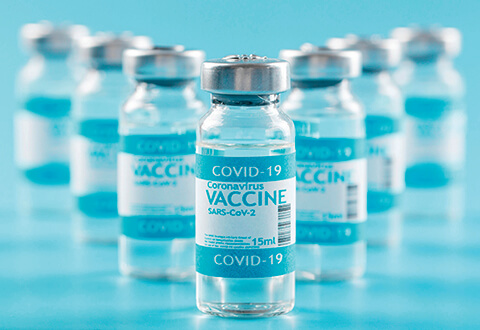The nationwide Covid-19 vaccination programme helps safeguard our people against the virus and restore our economy. The programme began in December 2020 and as of 7 June 20211, more than 1.8 million individuals have completed the vaccination.
COVID-19 could potentially be life-threatening and cause death, in particular in the elderly and vulnerable groups such as those with co-morbidities. As more people get vaccinated, those who cannot receive vaccination for medical reasons (such as individuals with severely weakened immune systems, or subgroups such as children where safety data is unavailable), will receive indirect protection. This in turn, lowers the risk of virus transmission in the community and does not put a strain on our healthcare system, protecting us and our loved ones in the long run.
Higher risks of severe COVID-19 infection
The COVID-19 virus can be transmitted from person to person via droplets in the air, or through touching contaminated surfaces. Individuals with heart conditions, such as heart failure, dilated cardiomyopathy, severe arrhythmogenic right ventricular cardiomyopathy and congenital cyanotic heart disease, face the most risk2.
The virus affects the airways and lungs, causing breathlessness. It may further develop an inflammatory reaction, placing stress on the cardiovascular system and resulting a drop in both the blood oxygen and blood pressure levels.
When this happens, the heart would have to beat faster and harder to supply oxygen to the major organs. This means the COVID-19 virus inevitably causes greater harm for patients with heart conditions.
Vaccination for patients in NHCS
To support the nation’s vaccination efforts, public healthcare institutions are offering COVID-19 vaccinations for their patients. At NHCS, patients who are on outpatient follow-up and are medically eligible, are offered vaccination.
As of 9 June 2021, 450 patients have been fully vaccinated in NHCS. We strongly urge all heart patients to have themselves vaccinated in view that they are more likely to experience serious complications should they get infected.
FREQUENTLY ASKED QUESTIONS

Is the vaccine safe for patients with heart conditions?
Yes. The vaccine is safe for patients with heart conditions, even those with pre-existing heart conditions such as ischaemic heart disease, coronary heart disease, abnormal heart rhythms, pulmonary hypertension, heart failure and adult congenital heart disease. It is also safe for patients who have undergone heart surgeries or procedures.
Is the vaccine safe for those taking anticoagulation drugs?
Yes. Being on blood thinning medication is not a contraindication to vaccination. However, if you are on strong blood thinning medication, please inform the vaccinator prior to vaccination.
What should patients with heart conditions take note pre-vaccination?
Please inform your doctor if you are:
- Receiving immunosuppressive therapy;
- Recovering from a recent procedure or surgery (within 2 weeks); or
- Feeling unwell
Your doctor will review your suitability prior to vaccination.
In addition, patients are advised not to consume alcohol, exercise strenuously or take precautionary painkillers prior to vaccination. It is advisable to have a proper meal (no fasting is required) and a good night’s rest prior to getting vaccinated.
What about post-vaccination?
Patients may experience common side effects such as pain and soreness in the arm, fatigue, lethargy, headache and fever. These symptoms may last for a few days.
It is rare to have severe allergic reaction. This would usually happen during the first 30 minutes after vaccination hence it is important for patients to be observed for this period post-vaccination.
It is also recommended for patients to avoid strenuous physical activity, such as running, competitive sports, or playing ball games, for one week after your vaccination (regardless of first or second dose), especially for adolescents and younger men aged less than 30 years.
Are there any existing underlying conditions that would prevent certain patients from taking up the vaccine?
Patients who have had a severe allergic reaction such as anaphylaxis or a previous allergy to flu vaccination, are now able to receive their vaccination based on the latest guidelines from Ministry of Health3. However, individuals with a history of anaphylaxis to any component of the mRNA COVID-19 vaccine are still not recommended to receive the mRNA COVID-19 vaccine.
Patients who have fever, flu or gastroenteritis are advised to reschedule their vaccination. Patients with heart conditions who have acute medical issues such as decompensated heart failure are also advised to hold off vaccination until the issues are resolved.
In view of the current wave of new infections, are there preventive steps which patients could adopt?
Besides vaccination, it is important that we continue to wear a mask and adhere to safe distancing measures. This is because it would take some time to complete the vaccination for the entire population. During this period, there are still many people who are not protected and hence, susceptible to an infection should there be an outbreak.
In addition, having a balanced diet (lots of fruits, vegetables and water), exercising regularly and staying positive will contribute towards stronger immune systems and sound mental health.
Note:
If you are a patient of NHCS and are medically eligible, you may speak to your doctor at your next visit to have your vaccination done in NHCS*.
*Updated January 2022: Covid-19 vaccination services is currently not provided in NHCS. If you are medically eligible, you may register for your vaccination to be done at the community vaccination centres. For more information, visit http://vaccine.gov.sg.
1,3 Source:
www.moh.gov.sg/covid-19/vaccination
2 Source:
https://www.escardio.org/Education/COVID-19-and-Cardiology/what-heart-patients-should-know-about-the-coronavirus-covid-19
Tags:
;
;
;
;
News Article;
;
National Heart Centre Singapore;
;
Murmurs (NHCS);
;
;
;
;
Murmurs
